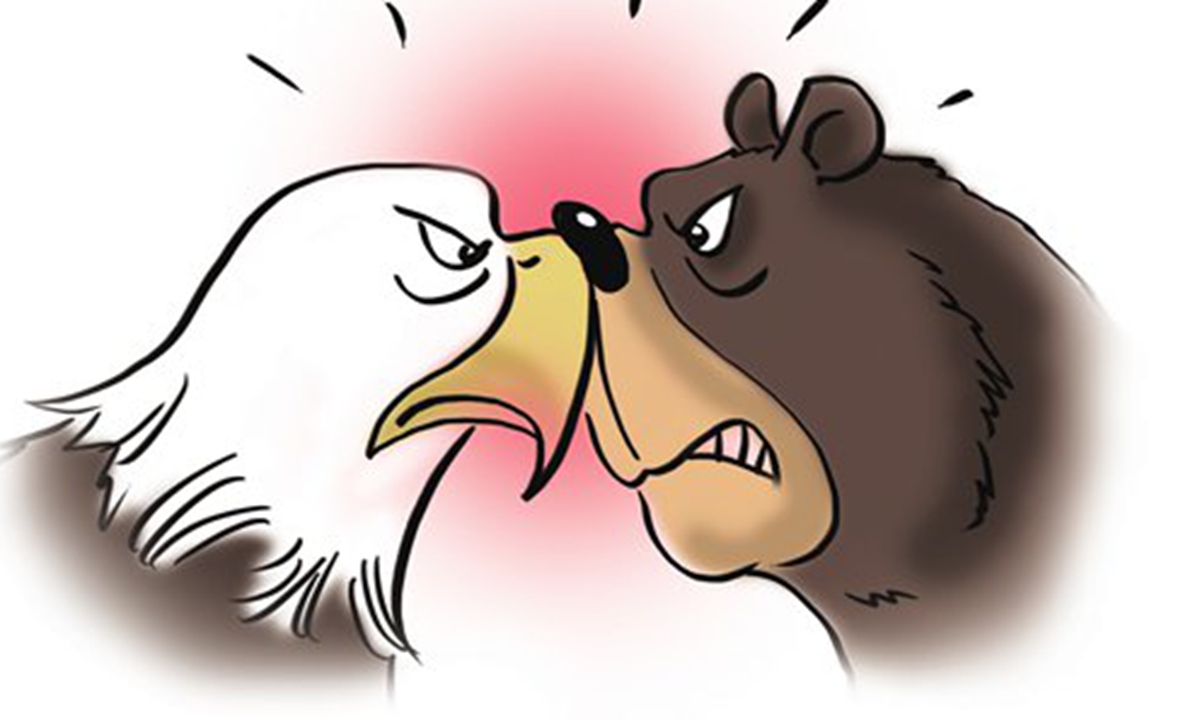Next US administration may turn up heat on Moscow
By Li Yonghui Source: Global Times Published: 2020/11/10 20:08:40

Illustration: Liu Rui/GT
Where will the US-Russia relationship head after the US presidential election? During his election campaign, Joe Biden called Russia the biggest threat to the US. As Biden seems poised to be confirmed as the 46th president of the US, such a statement has made many observers believe that the US-Russia antagonism will continue.Biden served as vice president in former president Barack Obama's administration. When Obama was in office, the antagonism between Washington and Moscow escalated - the relationship between the two was described to be at a "freezing point." Although Biden might not immediately take a tough stance against Russia after he is sworn in, affected by Obama's idea, he would probably go on a similar path to see Russia as US' main enemy in security term. In ideological terms, Washington will not stop its suppression campaign against Moscow.
Nonetheless, Biden said he wouldn't hesitate to agree to Putin's original proposal for a five-year extension of New Strategic Arms Reduction Ttreaty, the Associate Press reported on October 21. This hinted that Biden doesn't want to see the treaty falter. It also signals that there is room for the two countries to cooperate over arms control.
If the arms control talks break down, it means that a new arms race might be set off across the world. As Biden has to focus on the epidemic fight and economic recovery, he is reluctant to see such a scenario. Biden keeps a sober head in this aspect, so there will be a bottom line for US-Russia ties, where the two countries maintain the lowest level of collaboration and prevent their relations from breaking.
However, in terms of other policies toward Moscow, particularly about security, Biden will be relatively tough. He emphasizes order and rules; therefore he would reintegrate the transatlantic partnership to unite allies against so-called Moscow's threat. From this perspective, the US-Russia relationship will be tense after Biden takes power.
Russian President Vladimir Putin is well aware of this. Hence, in his media interview on October 7, Putin said the Democratic Party of the US is "traditionally closer to liberal values, it is close to the ideas of social democracy," and these positions could help build contacts with Russia, according to a New York Times report. This actually reflects Putin's prediction that US-Russia ties will not go very smoothly after Biden takes office.
In early March 2009, when then secretary of state Hillary Clinton met with Russian Foreign Minister Sergei Lavrov in Geneva, Clinton said she would hit "reset button" with Russia. The two countries have indeed made progresses in cooperation on nuclear disarmament, Afghanistan issue and Iran nuclear deal. Their relations also temporarily improved. But they returned to antagonism.
The trigger for this was the Ukraine crisis, from which the West saw that Russia won't budge over the bottom line in its post-Soviet geographic strategy. The westward part of this strategic space is adjacent to Europe, which actually involves the US-led NATO. NATO wants to push its defensive front to the western border of Russia, but Moscow will never allow such a military deployment to happen. Russia needs to set aside strategic space for itself, thus creating a security dilemma between the two sides.
In addition, the US-led Western camp feels its promotion of liberal values has been threatened and obstructed by Russia's influence in countries such as Belarus. Such ideological confrontations have resulted in the incompatible contradictions between Russia and the West headed by Washington.
Nevertheless, Moscow still hopes to ease tensions with the West. Even if there is slight hope, Russia would give a try in order to make a relatively benign environment for its national development, which has been affected by US sanctions. The constant stalemate in US-Russia ties has brought huge losses to Russia's economic development. Moscow needs Western technology and investment; besides, under US sanctions, it is undergoing serious capital outflow. The continuing deterioration of US-Russian relations is undoubtedly unfavorable for Russia to change its current economic structure.
Against this backdrop, Russia has been wishing for sanctions to be relaxed or lifted by improving ties with the West. So Moscow is likely to seek breakthroughs to ease tensions rather than engage in head-to-head contests with Washington. If Moscow manages to find a sally port, it will be good news for the Russian economy.
From a global perspective, Russia's role is indispensable in many international hot spot issues. Although a totally amicable restart of US-Russian relations is basically impossible, the US and Russia still need to maintain a minimum level of cooperation. Biden may dislike Russia, but in many aspects of international issues, he still needs Russia.
The author is a senior research fellow in the Institute of Russia, Eastern European and Central Asian Studies at the Chinese Academy of Social Sciences. opinion@globaltimes.com.cn
Posted in: VIEWPOINT